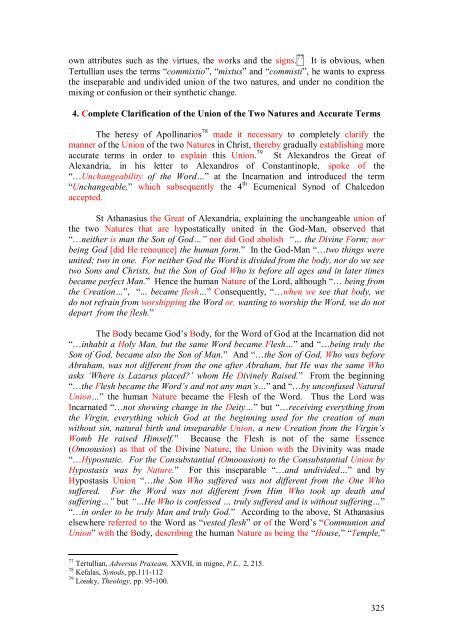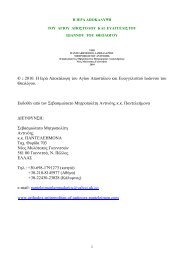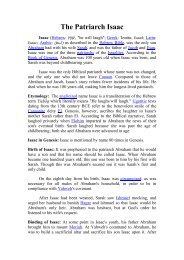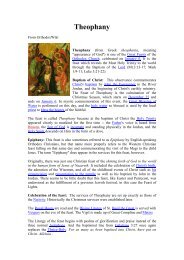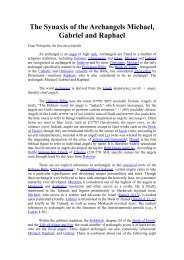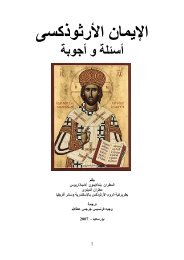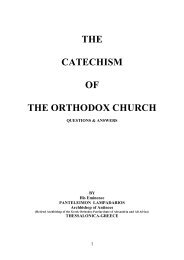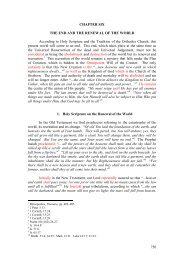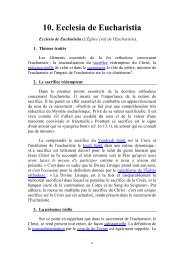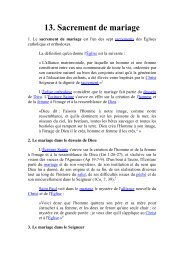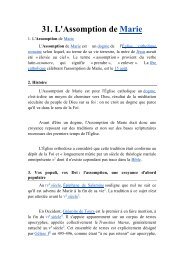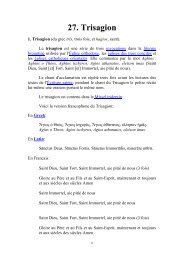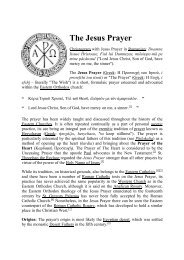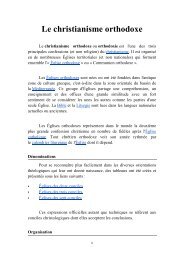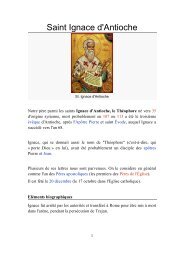028 part 3 chapter 6 the hypostatic union - Orthodox-mitropolitan-of ...
028 part 3 chapter 6 the hypostatic union - Orthodox-mitropolitan-of ...
028 part 3 chapter 6 the hypostatic union - Orthodox-mitropolitan-of ...
Create successful ePaper yourself
Turn your PDF publications into a flip-book with our unique Google optimized e-Paper software.
own attributes such as <strong>the</strong> virtues, <strong>the</strong> works and <strong>the</strong> signs. 77 It is obvious, when<br />
Tertullian uses <strong>the</strong> terms “commixtio”, “mixtus” and “commisti”, he wants to express<br />
<strong>the</strong> inseparable and undivided <strong>union</strong> <strong>of</strong> <strong>the</strong> two natures, and under no condition <strong>the</strong><br />
mixing or confusion or <strong>the</strong>ir syn<strong>the</strong>tic change.<br />
4. Complete Clarification <strong>of</strong> <strong>the</strong> Union <strong>of</strong> <strong>the</strong> Two Natures and Accurate Terms<br />
The heresy <strong>of</strong> Apollinarios 78 made it necessary to completely clarify <strong>the</strong><br />
manner <strong>of</strong> <strong>the</strong> Union <strong>of</strong> <strong>the</strong> two Natures in Christ, <strong>the</strong>reby gradually establishing more<br />
accurate terms in order to explain this Union. 79 St Alexandros <strong>the</strong> Great <strong>of</strong><br />
Alexandria, in his letter to Alexandros <strong>of</strong> Constantinople, spoke <strong>of</strong> <strong>the</strong><br />
“…Unchangeability <strong>of</strong> <strong>the</strong> Word…” at <strong>the</strong> Incarnation and introduced <strong>the</strong> term<br />
“Unchangeable,” which subsequently <strong>the</strong> 4 th Ecumenical Synod <strong>of</strong> Chalcedon<br />
accepted.<br />
St Athanasius <strong>the</strong> Great <strong>of</strong> Alexandria, explaining <strong>the</strong> unchangeable <strong>union</strong> <strong>of</strong><br />
<strong>the</strong> two Natures that are <strong>hypostatic</strong>ally united in <strong>the</strong> God-Man, observed that<br />
“…nei<strong>the</strong>r is man <strong>the</strong> Son <strong>of</strong> God…” nor did God abolish “… <strong>the</strong> Divine Form; nor<br />
being God [did He renounce] <strong>the</strong> human form.” In <strong>the</strong> God-Man “…two things were<br />
united; two in one. For nei<strong>the</strong>r God <strong>the</strong> Word is divided from <strong>the</strong> body, nor do we see<br />
two Sons and Christs, but <strong>the</strong> Son <strong>of</strong> God Who is before all ages and in later times<br />
became perfect Man.” Hence <strong>the</strong> human Nature <strong>of</strong> <strong>the</strong> Lord, although “… being from<br />
<strong>the</strong> Creation…”, “... became flesh…” Consequently, “…when we see that body, we<br />
do not refrain from worshipping <strong>the</strong> Word or, wanting to worship <strong>the</strong> Word, we do not<br />
de<strong>part</strong> from <strong>the</strong> flesh.”<br />
The Body became God‟s Body, for <strong>the</strong> Word <strong>of</strong> God at <strong>the</strong> Incarnation did not<br />
“…inhabit a Holy Man, but <strong>the</strong> same Word became Flesh…” and “…being truly <strong>the</strong><br />
Son <strong>of</strong> God, became also <strong>the</strong> Son <strong>of</strong> Man.” And “…<strong>the</strong> Son <strong>of</strong> God, Who was before<br />
Abraham, was not different from <strong>the</strong> one after Abraham, but He was <strong>the</strong> same Who<br />
asks „Where is Lazarus placed?‟ whom He Divinely Raised.” From <strong>the</strong> beginning<br />
“…<strong>the</strong> Flesh became <strong>the</strong> Word‟s and not any man‟s…” and “…by unconfused Natural<br />
Union…” <strong>the</strong> human Nature became <strong>the</strong> Flesh <strong>of</strong> <strong>the</strong> Word. Thus <strong>the</strong> Lord was<br />
Incarnated “…not showing change in <strong>the</strong> Deity…” but “…receiving everything from<br />
<strong>the</strong> Virgin, everything which God at <strong>the</strong> beginning used for <strong>the</strong> creation <strong>of</strong> man<br />
without sin, natural birth and inseparable Union, a new Creation from <strong>the</strong> Virgin‟s<br />
Womb He raised Himself.” Because <strong>the</strong> Flesh is not <strong>of</strong> <strong>the</strong> same Essence<br />
(Omoousios) as that <strong>of</strong> <strong>the</strong> Divine Nature, <strong>the</strong> Union with <strong>the</strong> Divinity was made<br />
“…Hypostatic. For <strong>the</strong> Consubstantial (Omoousion) to <strong>the</strong> Consubstantial Union by<br />
Hypostasis was by Nature.” For this inseparable “…and undivided…” and by<br />
Hypostasis Union “…<strong>the</strong> Son Who suffered was not different from <strong>the</strong> One Who<br />
suffered. For <strong>the</strong> Word was not different from Him Who took up death and<br />
suffering…” but “…He Who is confessed … truly suffered and is without suffering…”<br />
“…in order to be truly Man and truly God.” According to <strong>the</strong> above, St Athanasius<br />
elsewhere referred to <strong>the</strong> Word as “vested flesh” or <strong>of</strong> <strong>the</strong> Word‟s “Comm<strong>union</strong> and<br />
Union” with <strong>the</strong> Body, describing <strong>the</strong> human Nature as being <strong>the</strong> “House,” “Temple,”<br />
77 Tertullian, Adversus Praxeam, XXVII, in migne, P.L., 2, 215.<br />
78 Kefalas, Synods, pp.111-112<br />
79 Lossky, Theology, pp. 95-100.<br />
325


